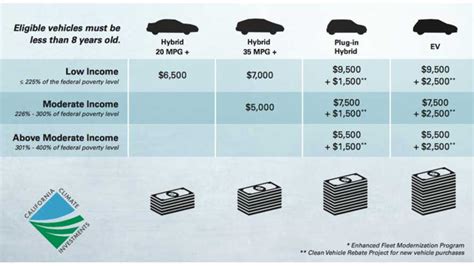Driving Change: How California’s Electric Car Rebate is Accelerating EV Adoption
As the world grapples with climate change and seeks sustainable alternatives to fossil fuels, California continues to pave the way in electric vehicle (EV) adoption through innovative policies and incentives. One of the most significant measures put into place is the California Electric Car Rebate program, designed to accelerate the transition to electric vehicles. This initiative has been instrumental in increasing access to EVs and promoting eco-friendly transportation options among California residents.
The Genesis of the Electric Car Rebate Program
The California Electric Car Rebate program was launched in 2010 as part of the state’s broader commitment to reducing greenhouse gas emissions and combating climate change. Administered by the California Air Resources Board (CARB), the program offers financial incentives for eligible buyers who purchase or lease new battery-electric and plug-in hybrid electric vehicles. The rebate amount can range from $2,000 to $7,000, depending on the model and battery capacity, making it more affordable for residents to transition to clean energy vehicles.
Impact on EV Adoption Rates
According to recent reports, California has seen a remarkable increase in EV adoption since the introduction of the rebate program. Many residents cite the financial incentive as a determining factor in their decision to purchase an electric vehicle. In 2020 alone, EV sales in California made up approximately 8% of all new car sales, a significant leap from previous years. The rebate program has not only encouraged individual consumers but has also attracted businesses and fleets to make the switch to electric, further contributing to the expansion of the electric vehicle market.
Enhancing Accessibility and Affordability
One of the most essential aspects of the California Electric Car Rebate program is its focus on accessibility. The program is designed to support all Californians, regardless of income level. In addition to the standard rebates, there are extra incentives for low-income individuals and families, allowing them to receive larger rebates. This ensures that the transition to EVs is not just limited to affluent consumers but is accessible to those who may benefit the most from energy-efficient transportation.
Supporting Infrastructure Development
California’s commitment to increasing electric vehicle adoption isn’t limited to financial incentives. The state is also investing in the necessary infrastructure to support a growing number of EVs on the road. This includes expanding the charging network, particularly in underserved areas. The California Electric Vehicle Infrastructure Project (CALeVIP) provides funding for the installation of charging stations throughout the state, making it easier for residents to charge their vehicles and reducing range anxiety.
Environmental and Economic Benefits
By facilitating the adoption of electric vehicles through the rebate program, California is not only advancing its environmental goals but also reaping economic benefits. A transition to electric vehicles contributes to improved air quality as fewer gasoline-powered cars mean fewer emissions. Moreover, the shift towards EVs fosters job creation in the electric vehicle and charging infrastructure sectors. Companies involved in manufacturing, research and development, and service operations related to electric mobility are emerging as vital components of California’s economy.
Challenges and Considerations
Despite its success, the Electric Car Rebate program faces challenges. Limited availability of certain EV models, high vehicle prices, and a lack of adequate charging infrastructure in some areas remain significant barriers to widespread adoption. Additionally, there are concerns about the impacts of battery production on the environment, and ensuring that the battery recycling process is sustainable is crucial for the program’s continued success.
Looking to the Future
California is committed to maintaining its role as a leader in sustainable transportation. In alignment with state goals to reduce greenhouse gas emissions by 40% below 1990 levels by 2030, the Electric Car Rebate program will continue to evolve. Policymakers are exploring additional incentives, expanding the eligibility of the program, and collaborating with manufacturers to ensure a wider variety of affordable electric vehicle options are available.
Conclusion
California’s Electric Car Rebate program has undoubtedly played a crucial role in accelerating the adoption of electric vehicles across the state. By combining financial incentives with investments in charging infrastructure and continuing education about the benefits of EVs, California is driving change in the automotive industry. As the state pushes towards a more sustainable future and strives to meet environmental goals, programs like the Electric Car Rebate are essential tools in combating climate change and promoting cleaner air for all residents.
FAQs
- 1. Who is eligible for the California Electric Car Rebate?
- Eligibility requirements vary but generally include being a California resident who purchases or leases a new battery-electric or plug-in hybrid vehicle. Additional incentives may be available for low-income consumers.
- 2. How much is the rebate under the program?
- The rebate can range from $2,000 to $7,000, depending on the vehicle’s battery capacity and model.
- 3. How can I apply for the rebate?
- Applications can be submitted online through the California Air Resources Board’s official website. It’s essential to apply within 18 months of purchasing or leasing the vehicle.
- 4. Are there additional incentives for low-income buyers?
- Yes, low-income individuals and families can qualify for larger rebate amounts as part of California’s commitment to making EVs more accessible.
- 5. What are the future goals for the Electric Car Rebate program?
- Future goals include expanding the program to accommodate more participants, enhancing funding for charging infrastructure, and working with manufacturers to create more affordable and diverse vehicle options.
Download California Rebate For Electric Cars
